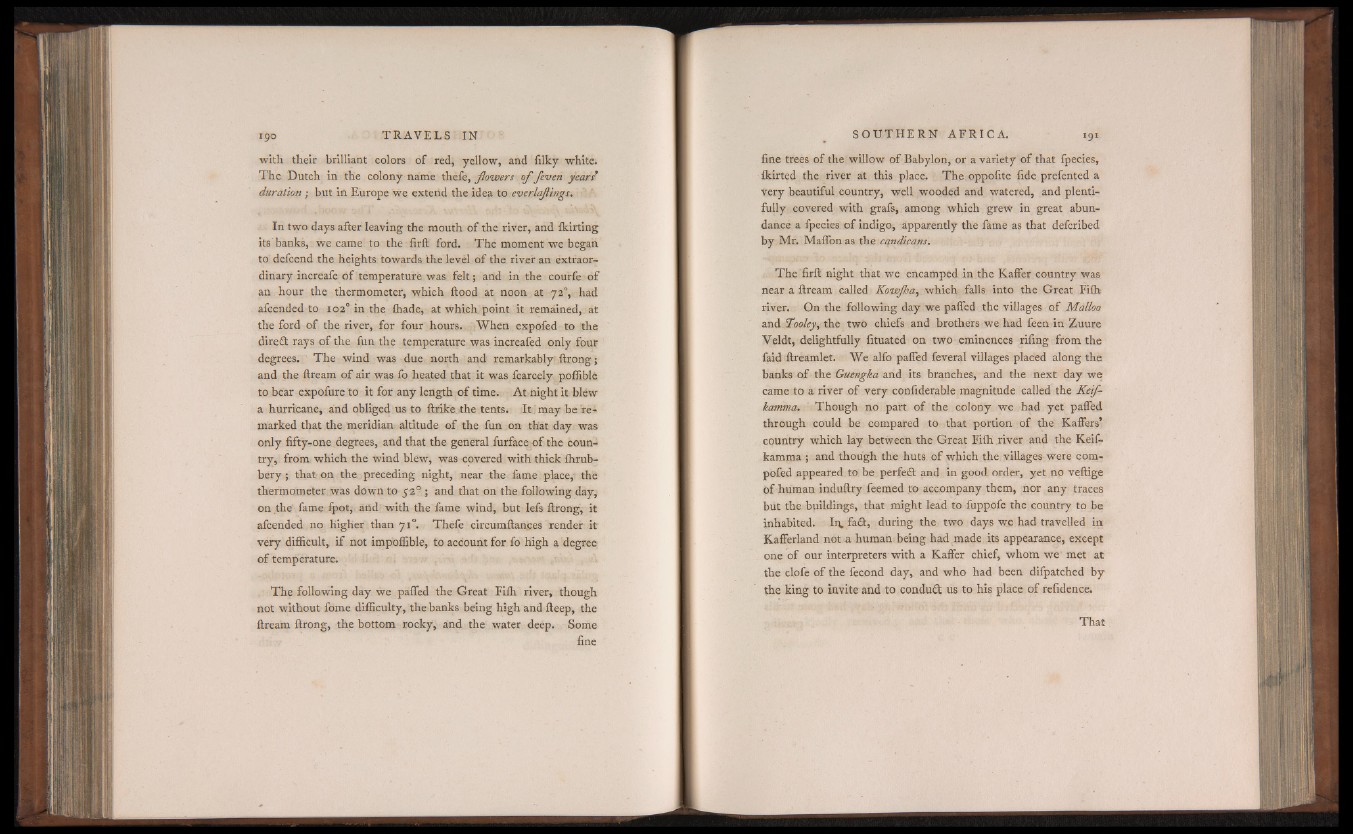
with their brilliant colors o f red, yellow, and filky white.
The Dutch in the colony name thefe, flowers o f feven years'
duration; but in Europe we extend the idea to everlaflings.
In two days after leaving the mouth of the river, and ikirting
its banks, we came to the firft ford. The moment we began
to defcend the heights towards the level of the river an extraordinary
increafe of temperature was felt; and in the courfe of
an hour the thermometer, which flood at noon at 72°, had
afcended to 102° in the ihade, at which point it remained, at
the ford of the river, for four hours. .When expofed to the
dire£t rays of the fun the temperature was increafed only four
degrees. The wind was due north and remarkably' ftrong;
and the ftream o f air was fo heated that it was fcarcely poffible
to bear expofure to it for any length of time. At night it blew
a hurricane, and obliged us to ftrike the tents. It may be remarked
that the meridian altitude o f the fun on that day was
only fifty-one degrees, and that the general furface o f the country,
from which the wind blew, was covered with thick fhrub-
b e ry ; that on the preceding night, near the fame place,1 the
thermometer was down to 520 ; and that on the following day,
on the fame fpot, and; with the fame wind, but lefs ftrong, it
afcended no higher than 71°. Thefe circumftances render it
very difficult, if not impoflible, to account for fo high a degree
o f temperature.
The following day we pafled the Great Fifh river, though
not without fome difficulty, the banks being high and fteep, the
ftream ftrong, the bottom rocky, and the water deep. Some
fine
fine trees of the willow of Babylon, or a variety of that fpecies,
fkirted the river at this place. The oppofite fide prefented a
very beautiful country, welL wooded and watered, and plentifully
covered with grafs, among which grew in great abundance
a fpecies of indigo, apparently the fame as that defcribed
by Mr. Maffon as the cqndicans.
The firft night that we encamped in the Kaffer country was
near a ftream called Kowjha, which falls into the Great Fifh
river. On the following day we pafled the villages of Malloo
and Tooley, the two chiefs and brothers we had feen in Zuure
Veldt, delightfully fituated on two eminences riling from the
faid ftreamlet. We alfo pafled feveral villages placed along the
banks of the Guengka and its branches, and the next day we
came to a river of very confiderable magnitude called the Keifl-
kamma. Though no part of the colony we had yet pafled
through could be compared to that portion of the Rafters’
country which lay between the Great Fifh river and the Keif-
kamma ; and though the huts of which the villages were com-
pofed appeared to be perfett and in good order, yet no veftige
of human induftry feemed to accompany them, nor any traces
but the buildings, that might lead to fuppofe the country to be
inhabited. Iiv fait, during the two days we had travelled in
Kafferland not a human being had made its appearance, except
one of our interpreters with a Kaffer chief, whom we met at
the clofe of the fecond day, and who had been difpatched by
the king to invite and to conduit us to his place of refidence.